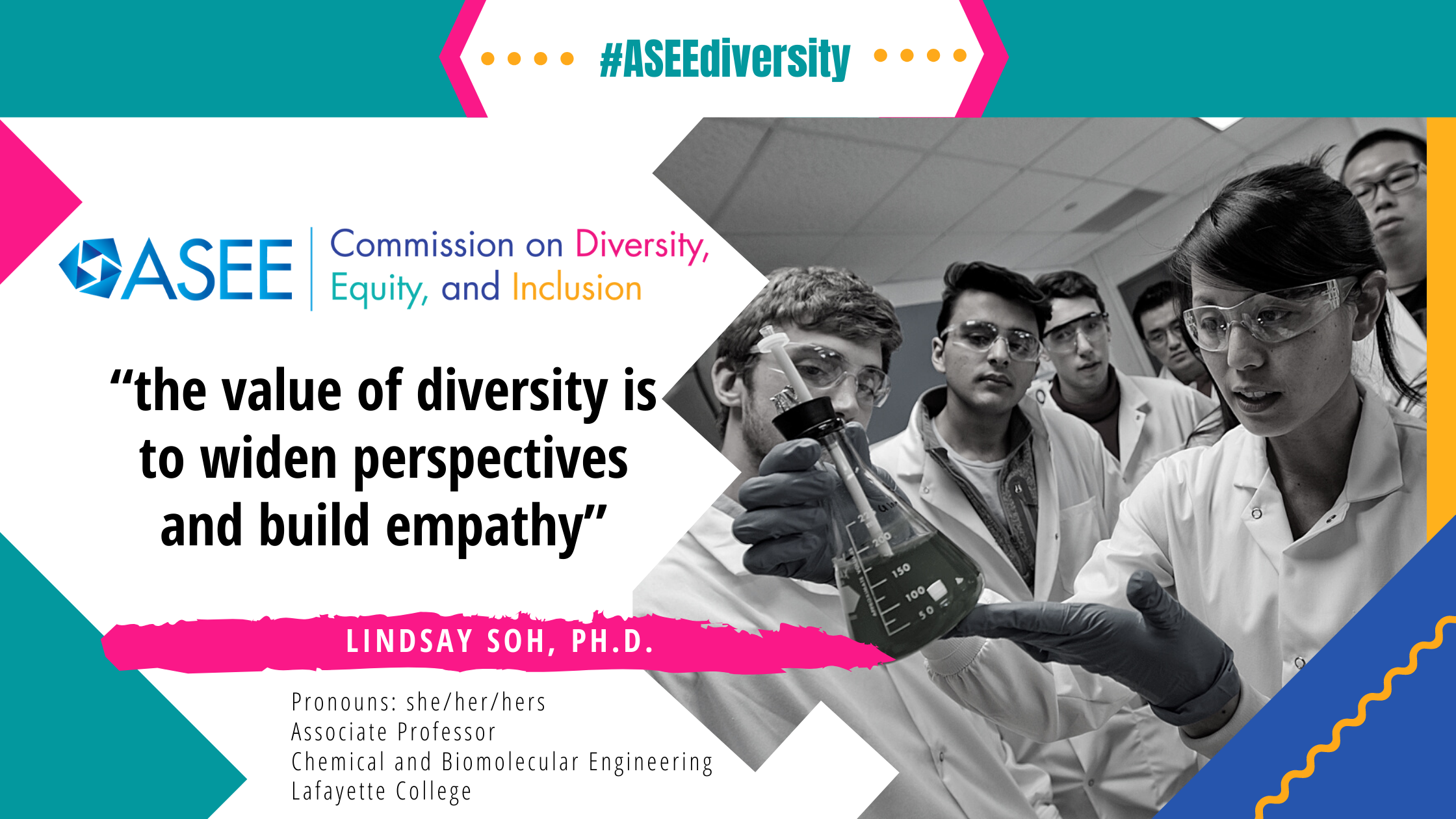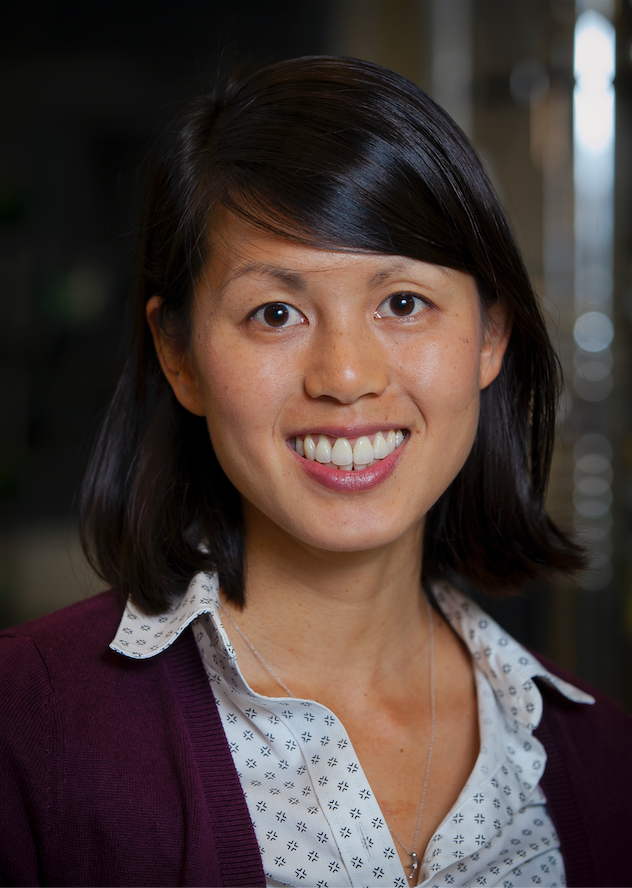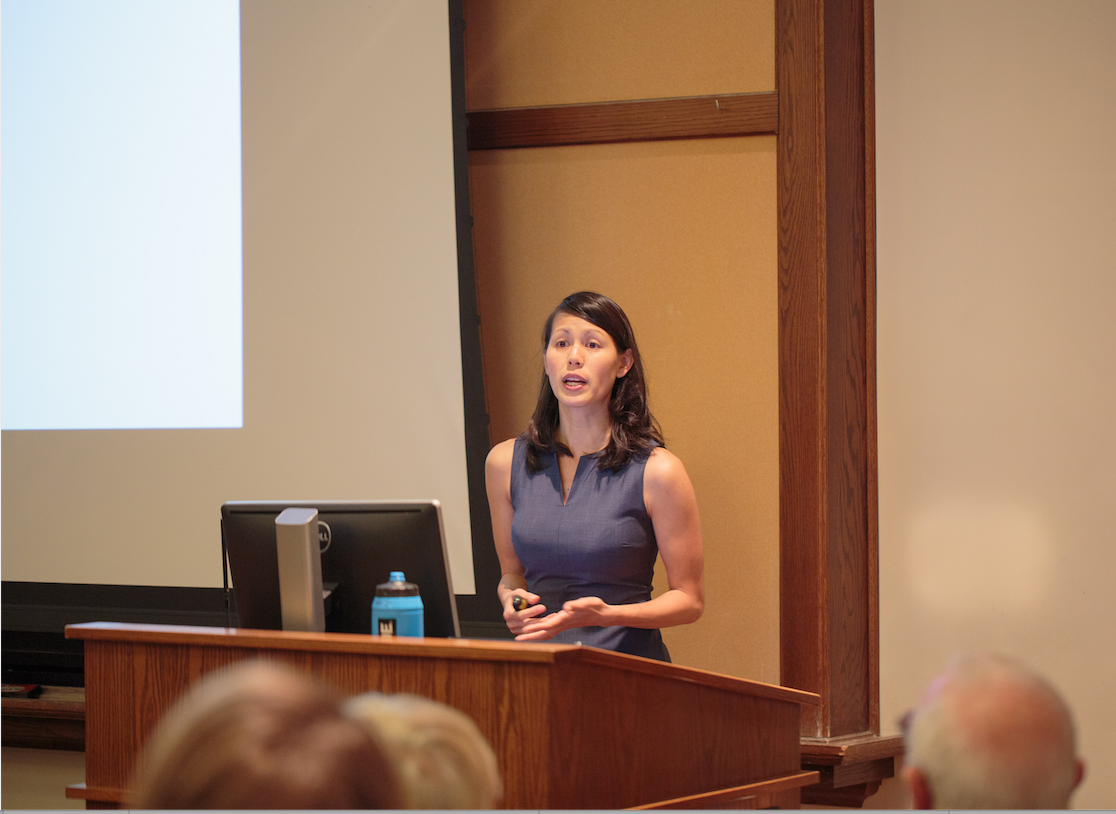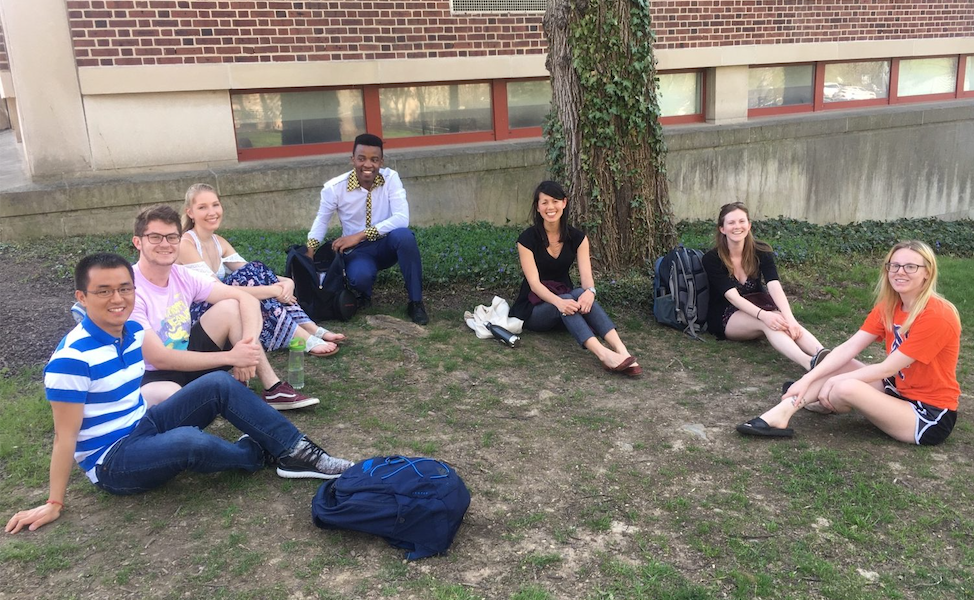
ASEE CDEI Scholar Spotlight Series: Dr. Lindsay Soh

Dr. Lindsay Soh: From actively maintaining a sense of belongingness to helping others develop their own
Dr. Lindsay Soh, associate professor and the Kate and Walter A. Scott ‘59 Scholar in Engineering, serves as the faculty advisor for Lafayette’s Minority Scientists and Engineers, a student organization which seeks to increase and retain underrepresented minority students in the field of computer science, engineering, mathematics, and physical sciences. The group supports student participation in regional and national conferences, offers mentoring programs that connect underclassmen and upperclassmen, and serves as a partner for the Society of Hispanic Professional Engineers (SHPE) and the National Society of Black Engineers (NSBE). Dr. Soh is also on the steering committee for Minerva, a group for women faculty in STEM.
Dr. Soh received a 2020 Henry Dreyfus Teacher-Scholar Award from the Camille and Henry Dreyfus Foundation, which honors young faculty in the chemical sciences who have created an outstanding independent body of scholarship and are deeply committed to education with undergraduates.
At the end of this post, don’t miss out on the opportunity to connect with our scholar and learn more about the ASEE CDEI‘s efforts.
ASEE CDEI Communications Committee Volunteers:
- Introduction and editor: Susan Boerchers, Lafayette College
- Editor and webmaster: : Sindia M. Rivera-Jiménez, Ph.D., University of Florida (Twitter)
Scholar Interview
Q: Can you tell us your story of belongingness?

Lindsay Soh, PH.D. Pronouns:she/her/hers Associate Professor Chemical and Biomolecular Engineering Lafayette College
Due to my background, my feeling of belonging has had to develop and be actively maintained over the years. Having lived in four different places – three different countries, and two different states by the time I was 11 years old – I never felt that I could catch up with the culture and sensations of my new peers, nor did I feel like I had an identity from a home far away. When asked: “Where are you from?” I felt confusion – Where was I born? Where did I currently live? Where do I most identify with? The common follow up questions of: “No, where you are really from?” pertaining to the Asian-looking girl with an American accent, further muddled my sense of identity. My younger self stopped trying to rely on others to support and understand me, often to the detriment of my friendships.
As an Engineering major in college, these previous experiences may have helped me to tune out some of the hardships that often accompany women in the field. In some of my 80+ person lectures, one could count the number of women on one hand (or at least the ones who came to class). I often just put my head down, learned the material as best I could, and continued on my course. Only later did I realize that others had study groups and a network of peers to help them through the rigors. However, it was during this time that I finally started to develop belongingness through social circles stemming from extracurricular activities. These peers served as my personal and emotional support and I quickly learned that these relationships were key to my well-being.
The intersectionality of being a woman and a “model minority” hit in graduate school where expectations of how I was “supposed” to act and what I really felt, led me to finally start to understand some of the negatives that these impressions may have on my career and personal well-being. These issues were exacerbated during my first few years as a faculty member – I basically look like the complete opposite of what students are expecting from a professor and had to put in the extra work to overcome these adverse perceptions. It was actually not until well into my faculty position that I learned the vocabulary and found peers that were talking about some of these problems. An on-campus group, Minerva, comprising tenured women faculty formed to help young faculty to cope with the additional pressures that women may feel particularly in STEM fields. These colleagues were essential in working through these hurdles – whether to talk about strategies to overcome, to lend a sympathetic ear, or to have someone with which to “laugh it off.” Belongingness, to me, is therefore not something that will just occur but rather something that can be fostered and may need to be actively worked towards. My goal is to help others find their sense of belongingness, so that they may feel supported and thrive through their struggles and successes.
I like to think of a task (whether it is getting into college, a course, graduating, or succeeding in your first job) as climbing a mountain. Some people have a clear-cut path and good hiking boots, and others are trying to climb a sheer rock face with no ropes or gear. Equity is trying to provide the same footing for those as they continue on their trek.
Q: What is your understanding of DEI and why it is important to what you do?
To me, the value of diversity is to widen perspectives and build empathy; diversity allows people from various backgrounds and experiences to find common ground and provide a wide range of experiences with which to share and grow from. Of course, getting a diverse range of students together requires an equitable means for students to access opportunities and succeed in them. I like to think of a task (whether it is getting into college, a course, graduating, or succeeding in your first job) as climbing a mountain. Some people have a clear-cut path and good hiking boots, and others are trying to climb a sheer rock face with no ropes or gear. Equity is trying to provide the same footing for those as they continue on their trek. Once students are in college it is difficult to sometimes find that sense of belongingness, i.e. inclusion. By helping to promote diversity and providing opportunities for people to find belongingness across different groups, students will hopefully feel validated and supported to pursue their goals.

Professor Lindsay Soh presented the 2017 Jones Faculty Lecture, which was established in 1966 to recognize superior teaching and scholarship at the College. (Photo by Bowen Hou ’21)
Q: What do you see as the next steps for your DEI work?
Throughout my career I have tried to work closely with student groups to try to provide them with the resources and opportunities to pursue their goals. Providing these opportunities is a good first step but I have found that sometimes students do not know what their goals could/should be. I hope to work more closely with students to really get to know their situations and try to mentor them in a way that not only provides them opportunities but also helps them to realize what they want to strive for.
Q: Who were your mentors and how did they help you?
My graduate student advisor, Julie Zimmerman, served as an awe-inspiring mentor to me. She is a trailblazer in her field, a leader within her institution, and a devoted mother. Her mentoring style pushed me to pursue paths that allowed me to both fail and succeed but ultimately supported the growth of my skillset and resolve.
Q: What is your mentoring philosophy?
Every student has a unique background and strengths/weaknesses. I try to create a tailored mentoring approach that helps students to recognize how they can take advantage of these differences and ultimately become independent self-advocates. For my research students this approach might mean that two students starting at the same time will have different interactions with me, but both will hopefully have the structure and guidance to push themselves and succeed. Over time I try to have students answer more and more of their own questions, not by being unavailable but rather by asking them questions to reframe the problem or showing them the resources they need to find an answer instead of just giving them a solution. Growth and maturity stem from this independence as well as the ability to prevail during adversity.

Professor Soh with students. The focus of her research work considers the means for creating or improving green engineering processes for energy and environmental applications.
Connect with our scholar:
- Website(s): Professional Site
Getting involved with CDEI
- If you want to recommend someone for our Spotlight series click here.
- Check out website Highlights:
- Resources
- Past Blogs and Events
- Compilation of Newsletters and Reports
- Connect with the committee:
- Become a Friend of the Committee
- Follow us and tag us on Twitter
- Become a volunteer on our Communications Committee! We are always looking for people that want to share or improve their writing and leadership skills.
Check out other Spotlight Scholars:
- Dr. Homero Murzi: Creating culturally responsive environments by focusing on the voices of our engineering students (September, 2020)
- Dr. Tony E. Butterfield: Empowering faculty and students to create an inclusive environment for the LGBTQ+ community (October, 2020)
- Dr. Carlotta A. Berry: From trailblazer to building a strong community and network to foster allyship and confidence among engineering students (February 2021)
